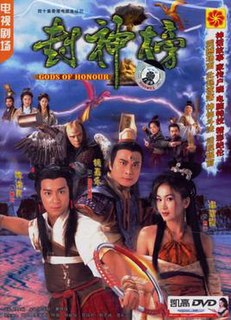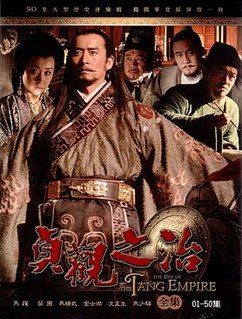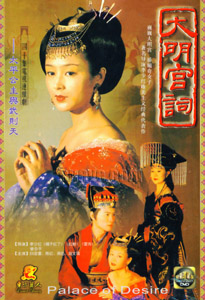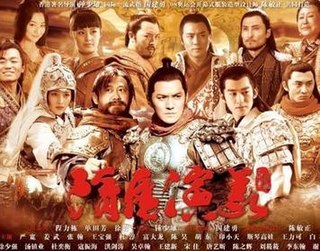Related Research Articles

Emperor Xuanzong of Tang, also commonly known as Emperor Ming of Tang or Illustrious August, personal name Li Longji, was the seventh emperor of the Tang dynasty in China, reigning from 712 to 756 CE. His reign of 44 years was the longest during the Tang dynasty. In the early half of his reign he was a diligent and astute ruler. Ably assisted by capable chancellors like Yao Chong, Song Jing and Zhang Yue, he was credited with bringing Tang China to a pinnacle of culture and power. Emperor Xuanzong, however, because of his interest in his two beloved concubines who were involved in governmental matters and was blamed for over-trusting Li Linfu, Yang Guozhong and An Lushan during his late reign, with Tang's golden age ending in the An Lushan Rebellion.

Emperor Xuanzong of Tang was an emperor in the latter part of the Tang dynasty of China. Personally named Li Yi, later renamed Li Chen, and known before his reign as the Prince of Guang, he was considered the last capable emperor of Tang China. Succeeding emperors after Xuanzong would either be too young or be dominated by eunuchs or warlords. Emperor Xuanzong was the 13th son of Emperor Xianzong and an uncle of the previous three emperors, Emperor Jingzong, Emperor Wenzong, and Emperor Wuzong.

Emperor Suzong of Tang, personal name Li Heng, né Li Sisheng (李嗣升), known as Li Jun (李浚) from 725 to 736, known as Li Yu (李璵) from 736 to 738, known briefly as Li Shao (李紹) in 738, was an emperor of the Tang dynasty and the son of Emperor Xuanzong. Suzong ascended the throne after his father fled to Sichuan during the An Lushan Rebellion in 756; Li Heng himself had fled in the opposite direction, to Lingwu, where he was declared emperor by the army. Much of Emperor Suzong's reign was spent in quelling the aforementioned rebellion, which was ultimately put down in 763 during the reign of his son Emperor Daizong.

Emperor Ruizong of Tang, personal name Li Dan, also known at times during his life as Li Xulun, Li Lun, Wu Lun, and Wu Dan, was the fifth and ninth emperor of Tang Dynasty. He was the eighth son of Emperor Gaozong and the fourth son of Emperor Gaozong's second wife Empress Wu. He was wholly a figurehead during his first reign when he was controlled by his mother, and he was the titular and puppet ruler of the Tang Empire from 684 to 690. During his second reign after his mother's death, significant power and influence was exercised by his domineering sister Princess Taiping.

Shek Wing-cheung, better known by his stage name Shih Kien, Sek Kin, or Sek Gin or Shek Kin(Chinese: 石堅; pinyin: Shí Jiān; Jyutping: Sek6 Gin1), was a Hong Kong–based Chinese actor. Shih is best known for playing antagonists and villains in several early Hong Kong wuxia and martial arts films that dated back to the black-and-white period, and is most familiar to Western audiences for his portrayal of the primary villain, Han, in the 1973 martial arts film Enter the Dragon, which starred Bruce Lee.

The Prince of Han Dynasty is a three-season Chinese television series featuring a fictionalised life story of Liu Che, Emperor Wu of the Han Dynasty. Season 1 was first broadcast on Beijing Television in 2001 in mainland China, followed by the second and third seasons in 2003 and 2005 respectively. Except for Huang Xiaoming, who played Emperor Wu in all three seasons, the cast members in each season are almost different from its preceding one.

Journey to the West is a Hong Kong television series adapted from the 16th-century novel of the same title. Starring Dicky Cheung, Kwong Wah, Wayne Lai and Evergreen Mak, the series was produced by TVB and was first broadcast on TVB Jade in Hong Kong in November 1996. A sequel, Journey to the West II, was broadcast in 1998, but the role of the Monkey King was played by Benny Chan instead, due to contract problems between Dicky Cheung and TVB. Cheung later reprised the role in another television series The Monkey King: Quest for the Sutra (2002), which was broadcast on TVB but not produced by the station.

The Legend of the Book and Sword is a Hong Kong television series adapted from Louis Cha's novel The Book and the Sword. The series was first aired on TVB in Hong Kong in 1987.

Royal Tramp is a 2008 Chinese television series adapted from Louis Cha's novel The Deer and the Cauldron. Produced by Zhang Jizhong and Huayi Brothers, the series consists of 50 episodes, filmed in high definition. The series was first broadcast on Jiangsu TV in China in 2008 and was subsequently aired on TVB in Hong Kong and other countries.
Wei Ping-ao, also known as Paul Wei, was a Hong Kong-based Chinese actor who started his career in the Shaw Brothers Studio. He is best known for playing cunning interpreters in Bruce Lee's 1972 films Fist of Fury and Way of the Dragon, in which he dubbed his own voice, and also appeared in films such as Deaf Mute Heroine (1971), Hapkido (1972) and Fists of Bruce Lee (1978). He suffered from jaundice in his later years. He died on 3 December 1989 in British Hong Kong.

Gods of Honour is a Hong Kong television series adapted from the 16th-century novel Fengshen Bang, a Chinese vernacular classic written by Xu Zhonglin and Lu Xixing. The series was first aired on TVB Jade in Hong Kong in 2001. It starred Benny Chan, Chin Kar-lok, Irene Wan, Michelle Ye, Dickson Lee, Yuen Wah, Kingdom Yuen and Winnie Yeung in the lead roles.

Letter 1949 is a 2008 Taiwanese drama starring Queenie Tai, Lin Yo-wei, Alien Huang, Hawick Lau. It was produced by Eastern Shine Production. The series was broadcast on free-to-air Chinese Television System (CTS) from 9 to 26 November 2008, Monday to Thursday at 20:00.

The Rise of the Tang Empire is a Chinese television series based on the events in the Zhenguan era during the reign of Emperor Taizong of the Tang dynasty. The 50 episodes long series is directed by Zhang Jianya and written by Ah Cheng and Meng Xianshi. It was first broadcast on BTV in China in December 2006.

Tang Ming Huang is a Chinese television series based on historical events in the reign of Emperor Xuanzong of the Tang dynasty. The series was directed by Chen Jialin and starred Liu Wei as the eponymous emperor. It was first broadcast on CCTV-1 in 1990 in mainland China.

Wu Zi Bei Ge, also known as Wu Zi Bei Ge: Wu Zetian Zhuan, is a 2006 Chinese television series based on the life of Wu Zetian, the only woman in Chinese history to assume the title of "Empress Regnant". The series was directed and written by Chen Yanmin, and starred Siqin Gaowa and Wen Zhengrong as the empress. The series' title Wu Zi Bei Ge literally means "Song of the Uncharactered Stele", with the "stele" referring to the unmarked one standing near Wu Zetian's tomb at the Qianling Mausoleum.

Palace of Desire, also known as Daming Gong Ci, is a Chinese television series based on the life of Princess Taiping, a daughter of China's only female emperor, Wu Zetian. Directed by Li Shaohong and Zeng Nianping, the series starred Chen Hong, Zhou Xun, Gua Ah-leh and Winston Chao in the leading roles. It was first broadcast on CCTV-8 in mainland China on 30 March 2000. The scriptwriter used extremely poetic and theatrical language for lines.

Heroes in Sui and Tang Dynasties is a Chinese television series based on Chu Renhuo's historical novel Sui Tang Yanyi, which romanticises the historical events leading to the fall of the Sui dynasty and the rise of the Tang dynasty. The series was first broadcast in mainland China on various television networks on 14 January 2013. It is not to be confused with Heroes of Sui and Tang Dynasties 1 & 2, a similar television series also based on the novel, but was released earlier in December 2012. Filming for the series started on 5 November 2011 at the Hengdian World Studios and wrapped up in May 2012.
Austin Wai Tin-chi was a Hong Kong actor and choreographer. He was the elder brother of actress Kara Wai. He had notable roles in the martial arts films like The 36th Chamber of Shaolin, 5 Superfighters, The Avenging Eagle and Flash Point.
References
- ↑ "Tang dynasty". Encyclopaedia Britannica. Retrieved 25 June 2020.
- ↑ Lewis, Mark Edward (2009). "China's Cosmopolitan Empire: The Tang Dynasty". Good Reads. Belknap Press Harvard University Press. Retrieved 25 June 2020.
- ↑ Donn, Lin. "Tang Dynasty 600 CE-900 CE: Ancient China for Kids". Mr.Donn. Retrieved 25 June 2020.
- ↑ "Li Longji — The Controversial Emperor Xuanzong of Tang, and His Extreme Accomplishments and Destruction". China Fetching. Retrieved 25 June 2020.
- ↑ "Xuanzong: Emperor of Tang dynasty". Encyclopaedia Britannica. Retrieved 25 June 2020.
- 1 2 "The Later Tang". TanSuo Cultural Travel. Retrieved 25 June 2020.
- ↑ "Emperor Xuanzong of Tang". Totally History. Retrieved 26 June 2020.
- ↑ Bennett Peterson, Barbara (2015). "Empress Wei, wife of Zhongzong, Tang dynasty in Notable Women of China: Shang Dynasty to the Early Twentieth Century". Taylor and Francis Group. Routledge. doi:10.4324/9781315702063-62 . Retrieved 25 June 2020.
- ↑ Twitchett, Denis (2019). The Tang Imperial Family in Critical Readings on Tang China: Volume 1, editor Paul W. Kroll, pages 63-65. Koninklijke Brill. ISBN 9789004380158 . Retrieved 25 June 2020.
- ↑ "Wei:Empress of Tang dynasty". Encyclopaedia Britannica. Retrieved 26 June 2020.
- ↑ "The 10 Most Famous Chinese Empresses". China Whisper. Retrieved 26 June 2020.